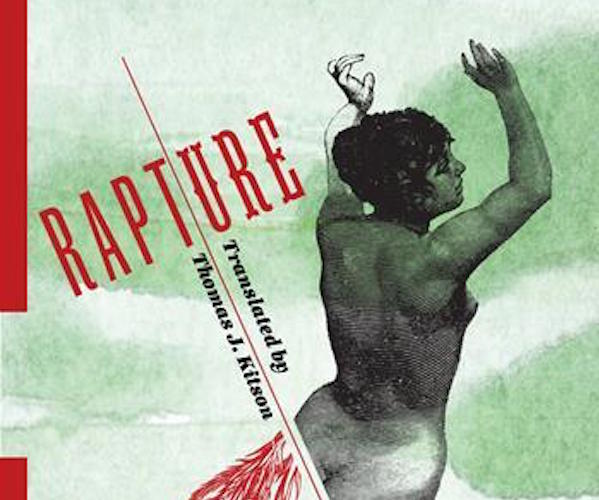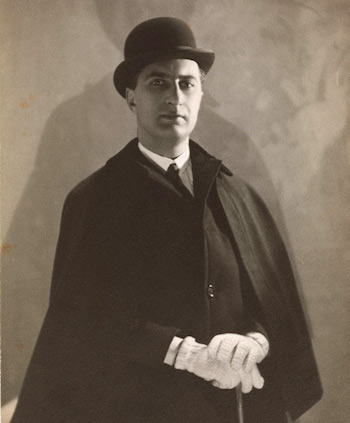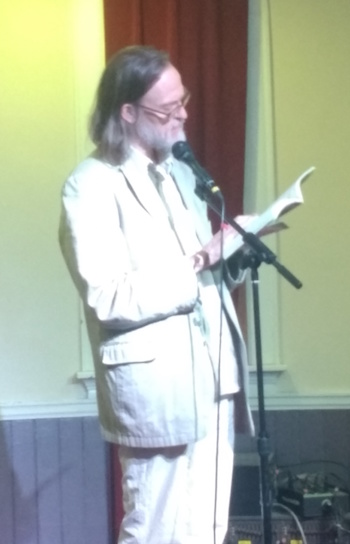Book Interview: Thomas Kitson on a Neglected Gem of Russian Modernism
Iliazd is more interested in working through all the possible reasons that generate behavior rather than grappling with issues of morality.

By Lucas Spiro
Earlier this year, I wrote about the first English translation of Iliazd’s novel Rapture (Columbia University Press). It’s an incredibly bizarre book, but also thoroughly enjoyable, and exposed me to an overlooked figure of the modernist period. The narrative follows Laurence, a draft dodger cum bandit, who terrorizes the countryside and then gets into all kinds of madcap adventures in a surreal landscape based on Iliazd’s childhood home in the Caucuses.
I sat down with the volume’s translator, Thomas J. Kitson, when he was recently at the Somerville Armory for a reading. The lineup also featured Harvard professor and poet Steph Burt, local musician Gilmore Tamny, and a performance (masterminded by Ernst Karel) of electronic sounds served up by a suitcase full of wires and found sounds. The multidisciplinary nature of the evening was the perfect setting for a reading from Iliazd’s novel; he was an eclectic artist who was involved with as many different movements and figures from the modernist period as you can count. My conversation with Kitson covered philosophy, history, communism, Russian futurism, psychology, and more. I don’t know if I have any better understanding of what Rapture is about after the talk, but the novel and its author are fascinating and certainly deserve further study. Kitson’s translation opens up the life and work of Iliazd to an entirely new readership.
Arts Fuse: Why Rapture? Why Iliazd? Why now?
Kitson: It’s something I first picked up 20 years ago when I was working on Russian Futurist poetry at Ohio State, taking an evening class in translation with Dick Davis. I was working on another Futurist poet, Aleksei Kruchenykh, who did these short prose bits that are completely absurd, like a marriage between a bear and a flower. He was one of the originators of ‘beyonsense.’ But I discovered that Ilia Zdanevitch (pen name Iliazd) had this novel which I had never heard anything about. I thought I would do a translation of the first chapter for my final project. And I did and decided at the time I just didn’t get it.
I wasn’t getting the translation right even though, linguistically, it’s a relatively straightforward novel. Jump ahead 15 years. I’ve gone through a doctoral program in Russian literature, done a lot more reading, done a lot more living, and I decided I wasn’t going to teach anymore and thought: what am I going to do now? So I thought I’d go back to Zdanevitch. This time I fell in love with his prose and felt much more at home with it, so I just decided I’ll do a translation and start shopping it around and hope someone would be interested. If not, then it was a pleasant experience; it was a kind of a growth thing.
AF: How does Rapture change or fit into common conceptions of modernism?
Kitson: I don’t know that it drastically changes anything. Even though the Russians were connected with transatlantic and international movements among modernists, Iliazd himself was quite isolated, so it sits a little differently. When Iliazd was working on Rapture he had already been involved for several years with writers in France and with emergent surrealism, so it absorbed some of the things that were fascinating to the latter writers, like Gothic novels and Freud, and brought them into contact with things that were coming out of Russian modernism, which was reworking of Dostoyevskian themes. Iliazd’s writing is also intimately connected to Russian symbolist poetry, especially Alexander Blok, as well as the prose of Andrei Bely. On a secondary level, there’s modernism’s interest in the occult and theosophy.
AF: Initially, Iliazd was influenced by the Symbolists and then later by Marinetti and Futurism. But during the Russian civil war he becomes disenchanted with violence and destruction. Rapture has these weird occurrences where someone will fall and end up on a higher dream plane than they were before. Is this a return to the Symbolist approach of art and poetry? Does Rapture deal with the concept of de realibus ad realiora, this notion of ‘from reality to the more real or higher reality?’
Kitson: Iliazd was not a direct witness to a lot of what went on in the civil war. But yes, the novel is a kind of return to Symbolism through the attitudes and techniques of the avant garde. I’m still trying to get my bearings on Iliazd’s view of the universe. He talks about what people aspire to, toward the ‘more real’ in symbolist terms, but Iliazd doesn’t think this kind of transcendence is attainable, which was the case for some of the other Symbolists. With occultism or esoteric knowledge, the idea is that if you learn enough or gain enough experience, do the right things, say the right words, that at some point you become like a magus who has a sort of magical power. For Iliazd there’s always a gap between goal and desire, and this gap goads further desire. But you never attain some sort of mystical wholeness. He is interested in this stuff because it gives you energy, draws you into new places.

Iliazd in Paris in 1930. Photo: Tretyakov Gallery.
AF: There is a baffling passivity in Iliazd. Things happen to his characters; they rarely act. In that way it is quite a cruel book. Material gain is quickly squandered, the possibility of becoming worthwhile is shown to be an illusion. Why does he take this position?
Kitson: Some of the indifference and the cruelty in Rapture comes from the fact that its generative principles are not character based. We spoke earlier about detective fiction and how there’s a conflict between novels driven by plot or characters — the best have something of both. I think a lot of what Iliazd is doing is a little like the French Oulipo writers, who set themselves ground rules for their texts. Iliazd wrote a novel before Rapture that wasn’t published until the ’90s called Parisites: An Inventory. Its standard plot has been put together in an unusual way — it has something to do with the way you would organize an inventory. There’s a set of characters and there are requirements that the novel cover events taking place over a certain amount of time. Within that time, there are permutations of scenes in which characters are having some kind of tryst.
There’s other stuff that drives Rapture besides character. It’s not a psychological novel in the traditional sense, a look at the inner lives of the characters. But it’s very psychological in a general sense.
AF: You’ve mentioned before that Rapture‘s not a psychological novel. Yet we’ve been talking about Freud, Jung, and others.
Kitson: The volume takes themes from Dostoyevsky, especially Crime and Punishment, where you have an irrational crime that is followed by guilt. But Laurence goes through a satirical process of coming to terms with his responsibility for his crimes. It’s nothing like what happens with the moral rebirth of Raskolnikov; there are moments Laurence is agonized when thinking about his past, yet his logic and its conclusions are convoluted. You get this sense that Iliazd is more interested in working through all the possible reasons that generates behavior (pushing logic to the point of absurdity) rather than grappling with issues of morality.
AF: Can you talk a little about the title?
Kitson: For a long time when I was working on the manuscript I called it The Ravishing. I was focusing on the the notion we discussed earlier — whenever anyone acquires something it’s eventually dispersed or taken away. The ultimate movement of the novel seems to be toward a ravishing, a dissipation. After all, everything is taken away, the characters are deprived of everything, everyone’s dead at the end. But my editor and I settled on Rapture, which is closer to the fundamental meaning of the original Russian title. I had some reservations about that because in American culture a ‘rapture’ is thought of in a kind of Evangelical chiliastic sense. I didn’t want that association — the text has nothing to do with that. There are religious influences on the novel, but the notion of Christian rapture doesn’t exist in Orthodoxy.
Still, we settled on Rapture because it could be used in a fairly multivalent sense. The rapture of ecstasy is also the rapture of being torn out of yourself, being overcome, losing control, losing your liberty, which is essentially Laurence’s story, part and parcel of his absurd fight to be free from coercion.
AF: Why did publishers in the Soviet Union object to the novel?
Kitson: A lot of it was just bad timing. If Rapture had been written 2 years earlier it would have been published in the Soviet Union. Iliazd had every expectation that the book would be published; there were influential publishers who had been open to this kind of experimentation on European modernism. But in 1927 and ‘28 there were shifts in the political situation: Stalin was shutting down Lenin’s NEP (New Economic Policy), which had allowed for more independent economic activity. Stalin was working toward gaining more control over publishing, centralizing it with the party affiliated houses.
At this point in time Stalin was also expelling Trotsky and the publishing house that was thinking of bringing out Rapture had recently been accused of being Trotskyist, which caused some problems. But you couldn’t make the jump to calling Rapture Trotskyist. Rather, publishers feared that the novel might be condemned as a religious or mystical tome rather than a political one. In addition, Stalin was generating a war scare; he was fostering suspicion for anything, even cultural, that was coming from outside the country. And there was increasing suspicion toward the avant-garde internally.

Translator Thomas Kitson. Photo: Lucas Spiro.
AF: You’d think Iliazd, who was so well connected with the art scene in Paris, could get his book translated and published there.
Kitson: His not getting Rapture published in Paris had a lot to do with his personality. After it turned out that he couldn’t publish the book in the Soviet Union, he didn’t turn to Russian publishers in Paris. Instead, he tried to have it translated into French. He was so at odds with the mainstream Russian immigrant community that he didn’t even entertain the idea that they would have published it. And I’m sure they wouldn’t have.
Part of the problem was that he was proud and stubborn. But there’s another factor I’m not entirely clear about. He came to see art as something that should be secret, mysterious, to be discovered in untimely ways. Did he come to this belief before he wrote Rapture? Or was this idea a response to his troubles having the novel published? He eventually published the book himself; I think he just gave most of the copies away.
AF: What do you think your translation will do in terms of generating interest in Iliazd?
Kitson: I feel some responsibility to the novel because this is the most visible publication it has ever had. It wouldn’t surprise me if some Russians encounter the translation and go back and read Iliazd in the original. I would hope that it could even be a vehicle for Russian readers to rediscover him. Though I don’t know how realistic that is.
AF: Iliazd seemed to believe that the best thing for a poet was to be forgotten so that he or she could be discovered again. Are there intimations of resurrection in the book?
Kitson: On the one hand, he conceived Rapture as a kind of summing up. It marked the end of something. Yet, though the novel ends with everyone dead, there’s an ambiguity posited, a potential circularity. Right at the beginning, Mocius can hear the whining of an infant in pain, which might be the dying child at the end. And there’s the mahogany coffin and the mahogany cradle, so there are circular elements.
And there are resonances with the mythological basis of Eleusinian mysteries and Christian resurrection in the novel. The character Ivlita insists that trees are people who have finished one form of life and have entered another. So Rapture may not settle for a vision of closure; there’s something open, and that is optimistic. The word rapture has different valances; there are times when life means sacrificing everything to the point that everything is used up. Yet the word is also associated with new possibilities.
AF: Is there anything that no one has asked you about the book that you want people to know?
Kitson: I hope people will read it alongside other surrealist writing, such as Breton’s Nadia and Aragon’s Paris Peasant. On the surface, Rapture seems very different, but many of the underlying obsessions in the book resonate with the concerns of Breton. This is a rich text that can be read on many different levels — many of which are not wrong or mistaken. You can just read it and enjoy the story if that’s what you like, and you can read it and follow certain themes without worrying about the underlying source texts.
Lucas Spiro is a writer living outside Boston. He studied Irish literature at Trinity College Dublin and his fiction has appeared in the Watermark. Generally, he despairs. Occassionally, he is joyous.
Tagged: Iliazd, Lucas Spiro, modernism, Rapture, Russian literature, Thomas Kitson
